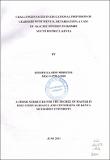| dc.description.abstract | The challenges faced in Educational Provisions of Learners with mental retardation in Akachiu Division in Igembe South District have not been fully understood and this as affected them in great deal. The purpose of the study was to investigate challenges faced in educational provision of learners with mental retardation in Akachiu Division in Igembe South District. By looking at educational challenges such as curriculum, negative attitudes towards these learners, political and economic problems, traditional beliefs, the researchers could propose possible solutions to these which will finally reduce stigmatization. The study used a descriptive research design. The study targeted parents, teachers, primary school pupils and church leaders from public primary school in the Division. The sample for the study was determined and selected randomly to obtain 50 teachers 200 pupils, 30 parents, 30 schools and 30 church leaders. The collection of the primary data relied on questionnaires administered to the study sample. The validity of the instruments was discussed between the researcher and the supervisors. The alpha coefficient was 0.73, suggesting that the items had relatively high internal consistency and the researcher therefore, considered the instruments reliable and accepted the research instruments. Using Statistical Package for Social Sciences (SPSS), descriptive statistics was used for data analysis and findings presented in tables and charts. At least 25.5% of the pupils indicated that inadequate facilities in the schools was a contributing factor to poor academic performance among learners with mental retardation. Pupils also indicated that the schools lacked trained teachers (19.0%) to handle children with mental retardation. According to pupils, learners with mental retardation encounter challenges to do with lack of funds (8.0%), low esteem (22.5%), basic care challenges (55.0%), stigma (23.5%), learning challenges (29.0%) and parental conflict (3%). Such challenges could negatively impact the provision of education to mentally challenged learners. The two major causes of mental retardation as given parents were biological/hereditary causes and birth complications. Majority (70%) of the teachers indicated that mentally retarded learners should not be taught using the same curriculum as normal pupils. According to church leaders, the syllabus should be improved (26.7%) and classes integrated (53.3%), teachers trained (53.3%), improved facilities and building more facilities (23.3%) suited for teaching pupils with mental retardation. The government of Kenya in collaboration with other relevant stakeholders should work together to ensuring education for all children, including those with disabilities, through the provision of inclusive and quality education that can be accessed by all and is relevant to all Kenyans. This study looked at challenges facing provision of education to children with mental retardation. The study suggests that further research is required with other forms of disabilities or impairment since this study dealt with only mental retardation. | en_US |

